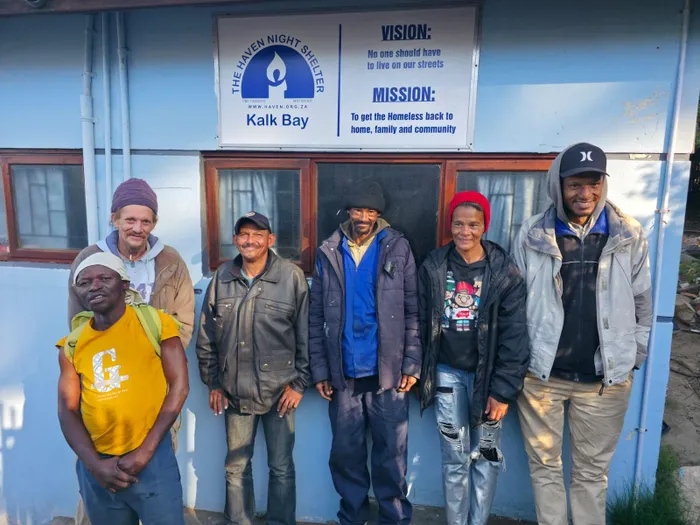From homelessness to hope: Six residents of Simon’s Town start anew in Mossel Bay

Six brave individuals from Simon’s Town have journeyed more than 400km to Mossel Bay, choosing hope and healing as they begin a new chapter at The Haven Shelter. From left are David Bam, Gary Carpenter, Paul Hendricks, John Klein, Suraya Williams and Micheal Williams
Image: Supplied
Six long-time homeless residents from Simon’s Town have taken a significant step towards rebuilding their lives by entering rehabilitation and shelter care in Mossel Bay, more than 400km from the streets they once called home.
The journey started when the family and friends of Haven Night Shelter CEO Shaddie Valayadum began handing out meals to homeless people on the beach every Saturday.
While feeding them, they encouraged the group to consider going to the shelter
Mr Valayadum, said eight people initially accepted the offer and reported to the Haven Kalk Bay shelter.
Of those, six made the courageous decision to be transferred to the Mossel Bay branch, where they could start fresh, far from the triggers of their past.
“They wanted to go somewhere far away to focus on getting their lives back together,” said Mr Valayadum.
“Being 400km away limits the temptation to return to the street and gives them a real shot at rehabilitation.”
Mr Valayadum said the Haven team understands the emotional weight of this decision.
“It’s a huge step. For many of these individuals, the streets were all they knew for over a decade. There’s fear, doubt, and anxiety. But there's also courage, and we celebrate that.”
One of the six, Suraya Williams, said she is thankful for the chance at a new life.
“We were only used to drugs and rummaging the streets. Please pray for us. This is a huge opportunity, and I’m excited,” she said.
Zonnica Scheepers, a social worker at Haven Mossel Bay, said her team prepared carefully to welcome the group with dignity and care when they arrived at 2am on Thursday, June 12.
“We greeted them warmly, offered a hot meal, and a place to rest. When you’ve been on the streets for so long, you need reassurance that you are safe,” said Ms Scheepers.
The group received orientation and personal introductions from the social work team and shelter manager Celesta Van der Merwe.
Each person was called by name - a small but meaningful gesture to help them feel seen.
Ms Scheepers said the first steps in helping someone adjust after years on the street include creating a sense of routine and safety.
“We explain that it’s okay to feel overwhelmed, and we support them through the adjustment period. If needed, we refer them to addiction counselling, medical assessments, and support groups like NA or AA.”
Emotions run high in the early days, with many feeling relief mixed with fear, shame, or distrust.
“People fear being judged or losing their autonomy. Some carry trauma. We listen without judgment and try to build trust slowly through consistency and respect,” she said.
The Haven shelters offer more than just a warm bed. Residents receive three meals a day, access to hot showers, internet, and Wi-Fi to connect with loved ones, and help with CVs and job-readiness programmes.
Social workers also help clients apply for IDs, state grants, and employment opportunities such as the City’s expanded public works programme (EPWP).
Mr Valayadum said the benefits of shelter far outweigh the risks of street life.
“There are no ablution facilities on the streets, no safety if you get sick or need medication. In shelters, we help people become self-sufficient again - it’s about restoring dignity.”
As winter sets in, the Haven keeps its doors open even when beds are full, converting communal spaces into sleeping areas to ensure no one is turned away.
“We will never be full. If someone is ready to come off the street, we’ll find a place for them,” Mr Valayadum said.
Related Topics: